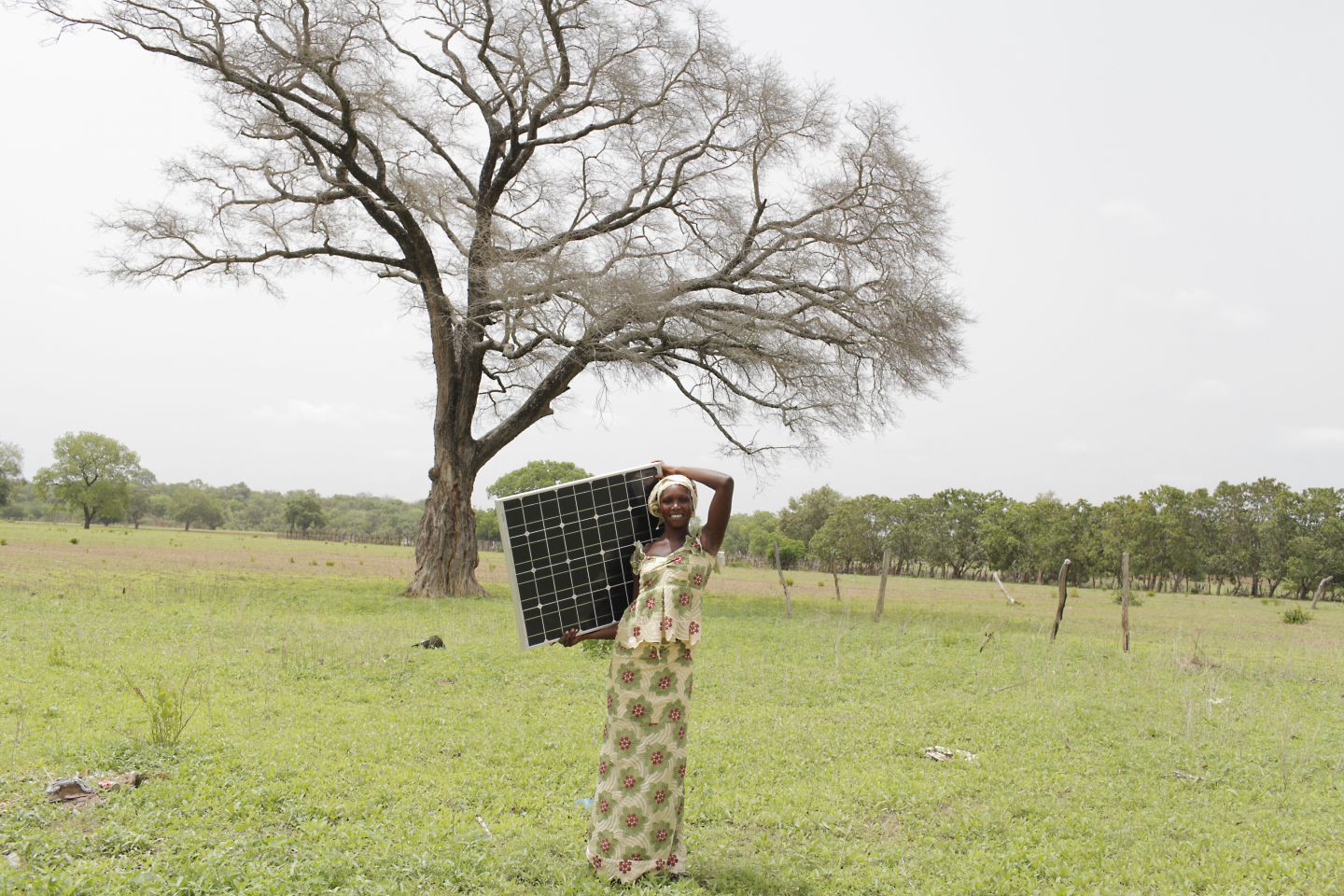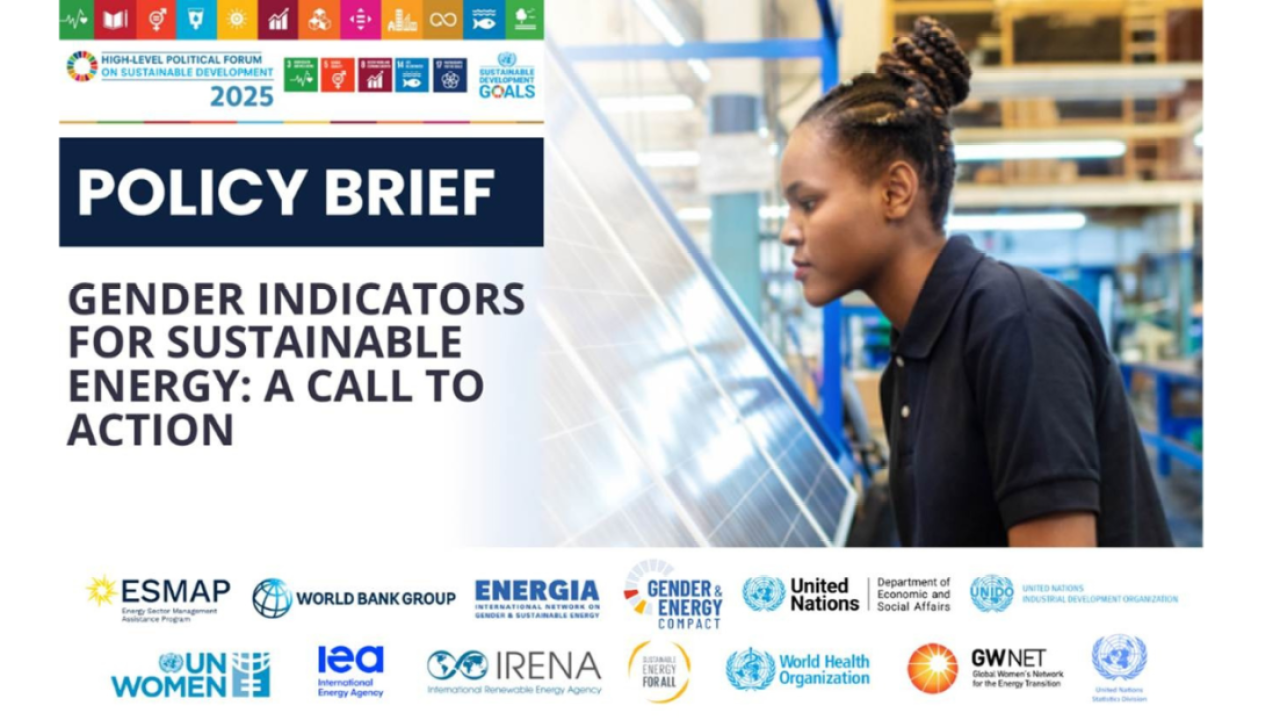by Silvia Sartori, Women’s Economic Empowerment Program Manager, ENERGIA International Network on Gender and Sustainable Energy | This article was originally published on The Guide – Season 3 | 2021 by Enlit
The just energy transition represents two core sustainable development goals as formulated by the United Nations Department of Economic and Social Affairs: access to affordable, reliable, sustainable and modern energy for all; and gender equality and empowerment of all women and girls.
For us at ENERGIA International Network on Gender and Sustainable Energy, both ensuring universal access to sustainable energy and addressing gender inequalities are at the very heart of our work.
Grounded in the sustainable development goals framework, the just energy transition is more than a technological move from one type of energy to a new, and cleaner one. It is also more than a strategy intended to combat climate change.
A just energy transition implies rethinking the way how societies, economies, political systems, international relations and trade are conceived and functioning in the Global North as well as in the Global South.
While they contribute to – and are impacted by – climate change differently, both industrialised and emerging economies are critically affected by it and no player can afford to ignore the issue or continue operating from a ‘business as usual’ perspective.
In transitioning from fossil fuels to renewable energies, elements of social and gender justice are equally important as environmental and technological considerations.
Girls and women are the backbone of the care economy, as the COVID-19 crisis has dramatically highlighted in the Western world.
Women remain the prime carers for young, ageing and most vulnerable family members and represent 70 per cent of the health care workforce.
Looking after the wellbeing of the household is still strongly considered as a women’s responsibility, including procuring food and, in the developing world, energy.
For the more than 2.6 billion people worldwide still lacking access to clean cooking, this translates into hours spent every day to collect firewood and in prolonged daily exposure to hazardous smokes emitted by inefficient cook stoves which are estimated to account for about 2.5 million premature deaths every year, a number that has likely gone up since the COVID-19 pandemic.
In addition, a significant component of the traditional workforce in climate-sensitive sectors, most notably agriculture, is still accounted for by women.
Nonetheless, despite being at the frontline of energy-related services, girls and women bear the brunt from energy poverty in a world where, before COVID-19, about 770 million people still lived without electricity access, a figure expected to have increased after the pandemic outbreak.
Concurrently, women are the least represented in decision-making fora. As a result, women’s needs, talents and views remain still substantially unheard and when new energy projects are conceived or new energy products are designed and launched in the markets, they do not generally take into account the impact on women, thus failing to acknowledge and mitigate unintended negative effects.
In Africa and Asia, the regions where ENERGIA has traditionally been working, we are cooperating with local and regional stakeholders, including civil society organisations and regulatory bodies, to foster inclusive consultation mechanisms, mainstream gender into renewable energy projects, develop enabling policy environments, leverage the potential of women as change agents and support women’s entrepreneurship in the clean energy space.
Our experience shows that local communities have the potential to benefit dramatically from a transition away from fossil fuels to renewable energies that is conceived and rolled out in an inclusive and participatory manner.
Especially rural areas, which to date are still vastly deprived of electricity access, can enjoy the ‘luxury’ of access to energy via simple and affordable technologies. Via their networks and groups, women keep proving to be most instrumental in facilitating the access of last mile households and communities to clean energy solutions.
This in turn can revitalize local economies by creating new value chains and generating new jobs (for both women and men), while minimizing labour migration, enhancing access to education and improving health and safety.
Girls and women are amongst those who have the highest stakes. Access to distributed renewable energy releases them from the task of collecting biomass and they can invest the newly saved time in income-generating activities, study or leisure.
Having access to electricity in the community generally improves public lighting and safety, which furthermore enhances women’s mobility. The ensuing virtuous cycle benefits households and communities at large, with proven positive effects on the provision of healthcare and the wellbeing of children, and ultimately strengthening resilience.
In our experience, for the energy transition to be truly just and sustainable, it is essential that representatives of all different community groups and members are effectively and meaningfully consulted and engaged at all stages of the design and development of an energy project.
Social and environmental audits are important tools to utilise prior to the implementation of a new plan.
Likewise, collection of gender-disaggregated data and a clear monitoring plan inclusive of gender- related targets and indicators ensure that the benefits for and impact on men and women are analysed throughout the process, so that mitigation measures and remedies can be timely adopted.
It is equally critical that a conducive policy- framework is in place, with fair representation, due diligence, compliance mechanisms and procedures.
Transparency and accountability improve governance and local ownership, which are key towards long-term resilience and contribute to peace and stability.
Political frameworks should be strongly aligned to the major international agreements, including on human rights, the SDGs and the principles of the Paris Agreement.
At the macro level, this also requires decision- makers and investors to adhere to coherent policy and financial decisions where renewable energy projects are to be supported both domestically and overseas, while plans and strategies are to be developed in order to phase out fossil fuel projects and investments.
From environmental degradation to worsening climate change, from migrations and social conflicts to increasing inequalities and health hazards, the journey of fossil fuel-based economies has clearly brought under the spotlight the urgent need for a more respectful, sustainable, resilient, equitable and safe paradigm.
Tapping into the potential of cleaner energies by embedding social justice and equality is becoming less of an option and more of a necessity.
There is no better time for embarking on this new journey than now, when the world is devising strategies to “build forward better” and strengthen resilience after the global COVID-19 pandemic.







